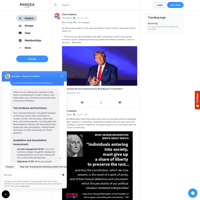Building Your Brand’s First Online Audience: Challenges and How Pangea Social Can Help Starting a...
Why Pangea Social Optimizes for Creativity
I came up with the Pangea Social algorithm to fill a need. But the need wasn't really simple. My family started with institutions that they copied from the United States and tried to start a society. They were trying to start China down the path of constitutional government. And they were trying to build every institution that they could find in America over there down to the YMCAs, so that they could create a country that had all the advantages of the United States plus all the advantages of China all in one place. They halfway got there until the Second World War kind of interrupted that and they just didn't have any way of handling the Japanese invasion and no way of handling how to fight off communism while they were simultaneously fighting the Japanese.
So when I came to this country, I had two impressions from my family. One is that they came from a war zone, and two is that they were deeply traumatized. My growing-up process was one where I was concerned about war and feared war a lot more than most kids did. I grew up in a town that had two Nike X bases on either side of the public high school. The idea that were only a 13 minutes horizon from NORAD actually reporting that we had to launch did not make me feel comfortable growing up. That's the kind of thing when you're a Cub Scout, makes a big impression on you. They take you to the Nike X site as a Cub Scout and say, “Look, guys, this is such cool technology.” And I'm going, “You're crazy.”
This is the most scary stuff I've ever known. I grew up like that. So my answer was in my mind, “why the <bleep> is the world so crazy!? And how in the world could you ever make it a rational place to live? And even if you could make it a rational place, would you even want to live in a rational place?” Because you'd always come up with this toy little world completely rationalized, but it's boring as <bleep>, and you would just beg to get out of there. Sort of what China is right now. It's been rationalized by the party. And now everybody who's like, less than 25, they're all “laying flat.” They're basically going back to live with their parents because they just can't stomach what they would have to face if they went out in the world.
The real premise of society has to be an increase in the creativity of society. That has to be the main reason, because anything else that's not creative, it's just a loop. It just means that you're going to perpetually manufacture the same goods, produce the same movie shows, cook the same food, and nothing will change without the creativity, like century on century, that's where you have to build. And so I devised this algorithm to actually measure how to optimize creativity. But the creativity that I measure isn't the same thing as the creativity that you can't put a metric on. It has to be very precisely defined. And I defined it in terms you might think of as dimensionality. So the ideas that are more creative have higher dimensionality because they reach into more other ideas. And by computing that dimensionality up front, I can solve three problems right out of the gate. One is that by always heading in the direction of higher dimensionality, you can guarantee that you won't get stuck in your thinking. And, secondly, by heading into higher dimensionality, you can weed out all the unethical patterns. Basically, what unethical patterns are is dimensionality collapsed, where people propose to do things a certain way and it shuts out possibilities for the other people.
So, for instance, slavery, it reduces dimensionality by reducing the slaves to lower dimensional humans, and their dimensionality is reduced by all the ways, all the things they cannot do as a slave, which you can name a lot of. So, you solve those two things. But the third thing that it solves is the ability to work together.
I think the most important thing is that higher dimensionality ideas provide a bigger umbrella for cooperating and for collaborating, for actually feeling like you're in the same boat as the other person. So between those three things, I think this is basically a miracle I'm trying to release with Cognitive Relativity AI and Pangea Social. The miracle is that by making higher dimensionality a conscious choice, Pangea optimizes the underlying supports for creativity, just as the publication of written language optimizes supports for social memory. By optimizing supports for creativity, problems that were insoluble become soluble: creativity is the universal solution to problems.



.jpg?width=50&name=ForstHeadshot%20(1).jpg)
